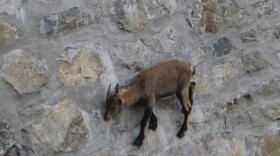
Robert Krulwich
Robert Krulwich works on radio, podcasts, video, the blogosphere. He has been called "the most inventive network reporter in television" by TV Guide.
Krulwich is the co-host of WNYC's Radiolab, a radio/podcast series distributed nationally by NPR that explores new developments in science for people who are curious but not usually drawn to science shows. Radiolab won a Peabody Award in 2011.
His specialty is explaining complex subjects, science, technology, economics, in a style that is clear, compelling and entertaining. On television he has explored the structure of DNA using a banana; on radio he created an Italian opera, "Ratto Interesso" to explain how the Federal Reserve regulates interest rates; he has pioneered the use of new animation on ABC's Nightline and World News Tonight.
For 22 years, Krulwich was a science, economics, general assignment and foreign correspondent at ABC and CBS News.
He won Emmy awards for a cultural history of the Barbie doll, for a Frontline investigation of computers and privacy, a George Polk and Emmy for a look at the Savings & Loan bailout online advertising and the 2010 Essay Prize from the Iowa Writers' Workshop.
Krulwich earned a Bachelor of Arts degree in history from Oberlin College and a law degree from Columbia University.
-
First I look in my right coat pocket. Nothing. Then my left. Nothing. Then my pants, right side — no. Then my pants, left side — yes! This is me at my front door, looking for my keys. Every day.
-
I'm going to play you a sound that you hear all the time. But this time, instead of hearing it in context (in a familiar setting — the movies, an Xbox, on TV, in a phone), it's all alone. Naked. Will you be able to identify it?
-
I'm thinking of a man and his cat. A real man. His real cat. Then I'm imagining a bunch of world-famous cartoonists, Calvin & Hobbes' Bill Watterson, Wile E. Coyote's Chuck Jones, Gary Larson, Maurice Sendak — all of them drawing this same man and his cat. Then I'm staring at very different men and very different cats. Then I'm giggling.
-
You order a lobster and the waiter shows you an animal that is, he says, older than you are. It's had more birthdays than you. For some people, this is a meal-stopper. Especially, if you are on in years, and what's on the plate is just as elderly (and just as wise?) as you are.
-
The idea seemed sensible: Send young elephants from a crowded national park in South Africa to an emptier one, where they could form a new herd and thrive. The problem? Elephants need elders. Without them, all hell breaks loose.
-
They look, at first, like dangerously protruding rocks on this towering, almost vertical wall in the Italian Alps. But then, uncannily, they move. What are they? And why don't they fall off? What are they doing?
-
Whatever happened on Easter Island, it wasn't good. Polynesians landed there, farmed, thrived, built their famous statues, and then things went very bad, very fast. Sixteen million trees vanished. What happened? Was this a case of ecological collapse? Not exactly, say two anthropologists. It was, arguably, worse than that.
-
When bees disappeared from central China years ago, Chinese apple farmers had to pollinate by hand. Embarrassing — people doing bees' work, but then came the big discovery –- a surprise that still haunts the conservation movement. What if people outperform bees?
-
Look inside most machines today and what do you find? Computer chips functioning mysteriously. Gaze at a 1920's Rube Goldberg cartoon and what do you find? Machines powered by hungry parrots and angry ladies. Will future tools stay inscrutable or become more Rube-like? Here's a guess.
-
Reporter Emily Graslie explores natural history museums, showing us what's going on behind the scenes. Her viewers write her, of course, and in this video, she reads some of those letters. They're not about science. Or Museums. They're about Emily. And it's embarrassing.










